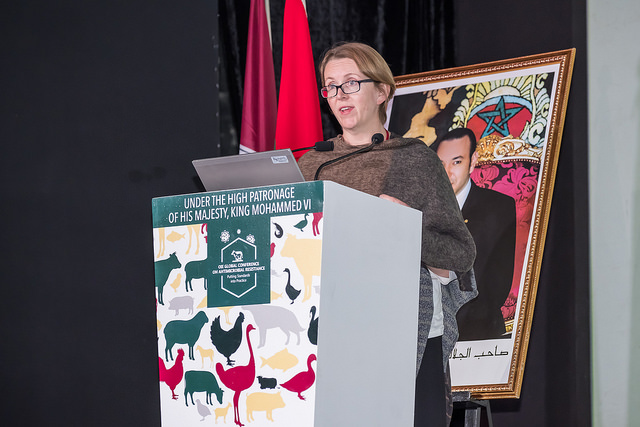Codex work presented at conference on antimicrobial resistance
Today the work of the Codex Task Force on Antimicrobial Resistance (TFAMR) was presented at the Second OIE Global Conference on Antimicrobial Resistance and Prudent Use of Antimicrobial Agents in Animals, which is taking place in Marrakesh, Morocco on 29-31 October 2018. The World Organisation for Animal Health (OIE) is focusing on ‘putting standards into practice’ at this year’s meeting.
Speaking in the session on Surveillance and Monitoring towards Effective Management of Antimicrobial Resistance, Sarah Cahill, Senior Food Standards Officer with the Codex Alimentarius Secretariat, highlighted the importance of the guidelines that Codex is developing on antimicrobial resistance. She explained that they are a means of providing its members with guidance on how to design and implement integrated surveillance of foodborne AMR and also to promote harmonization of approaches so that the information generated can be shared across sectors, countries and regions. “Implementing integrated surveillance can seem daunting, therefore the Codex guidelines aim to foster gradual improvement, by promoting a stepwise approach,” she said.

The conference, with approximately 500 participants from around the world, provides an opportunity to consider how the work on AMR being undertaken by the tripartite (FAO, WHO and OIE) and Codex Alimentarius as well as different consortia, including industry bodies, can be implemented on the ground in countries. The increasing level of collaboration on AMR at international level has been well recognized but as the support to countries to meet international standards and manage the threat posed by AMR increases even more coordination will be needed to ensure such support is optimally effective.
The Codex TFAMR will meet in Busan, Republic of Korea on 10-14 December 2018 to continue development of the draft Guidelines for Integrated monitoring and surveillance of foodborne antimicrobial resistance.
Read more about the Codex Task on Antimicrobial Resistance
See the OIE Global Conference On Antimicrobial Resistance website
At the heart of the Codex mandate are the core values of collaboration, inclusiveness, consensus building and transparency. Governmental and non-governmental, public and private organizations alike play a vital role in ensuring Codex texts are of the highest quality and based on sound science.
Codex would have little authority in the field of international standard setting if it did not welcome and acknowledge the valuable contributions made by observers. Expert technical bodies, industry and consumer associations
contribute to the standard-setting process in a spirit of openness, collaboration and transparency.
Intergovernmental organizations (IGOs) and international non-governmental organizations (NGOs) can apply for observer status in Codex in order to attend and put forward their views at every stage of the standard-setting process.
 Current Codex Alimentarius Commission
Current Codex Alimentarius Commission
Codex work presented at conference on antimicrobial resistance
Today the work of the Codex Task Force on Antimicrobial Resistance (TFAMR) was presented at the Second OIE Global Conference on Antimicrobial Resistance and Prudent Use of Antimicrobial Agents in Animals, which is taking place in Marrakesh, Morocco on 29-31 October 2018. The World Organisation for Animal Health (OIE) is focusing on ‘putting standards into practice’ at this year’s meeting.
Speaking in the session on Surveillance and Monitoring towards Effective Management of Antimicrobial Resistance, Sarah Cahill, Senior Food Standards Officer with the Codex Alimentarius Secretariat, highlighted the importance of the guidelines that Codex is developing on antimicrobial resistance. She explained that they are a means of providing its members with guidance on how to design and implement integrated surveillance of foodborne AMR and also to promote harmonization of approaches so that the information generated can be shared across sectors, countries and regions. “Implementing integrated surveillance can seem daunting, therefore the Codex guidelines aim to foster gradual improvement, by promoting a stepwise approach,” she said.

The conference, with approximately 500 participants from around the world, provides an opportunity to consider how the work on AMR being undertaken by the tripartite (FAO, WHO and OIE) and Codex Alimentarius as well as different consortia, including industry bodies, can be implemented on the ground in countries. The increasing level of collaboration on AMR at international level has been well recognized but as the support to countries to meet international standards and manage the threat posed by AMR increases even more coordination will be needed to ensure such support is optimally effective.
The Codex TFAMR will meet in Busan, Republic of Korea on 10-14 December 2018 to continue development of the draft Guidelines for Integrated monitoring and surveillance of foodborne antimicrobial resistance.
Read more about the Codex Task on Antimicrobial Resistance
See the OIE Global Conference On Antimicrobial Resistance website
 Codex and Observer
Codex and Observer
around the world since ancient times.
We might not always know where it comes from,
but we expect it to be available, safe and of good quality.









Leave a comment